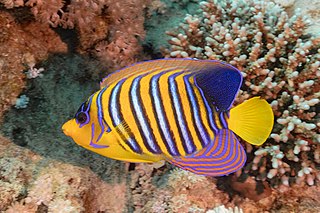
The royal angelfish, or regal angelfish, is a species of marine ray-finned fish, a marine angelfish belonging to the family Pomacanthidae, and the monotypic genus Pygoplites. It is found in tropical Indo-Pacific oceans. It can grow as long as 25 cm (9.8 in).

The blacktip grouper, also known as the redbanded grouper, blacktipped cod, black-tipped rockcod, footballer cod, red-barred cod, red-barred rockcod, scarlet rock-cod or weathered rock-cod, is a species of marine ray-finned fish, a grouper from the subfamily Epinephelinae which is part of the family Serranidae, which also includes the anthias and sea basses. It is found in the tropical Indo-Pacific region. It is the type species of the genus Epinephelus.
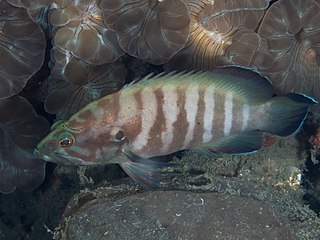
Cephalopholis boenak, the chocolate hind, brownbarred rockcod, brown-banded cod or brown-banded rockcod, is a species of marine ray-finned fish, a grouper from the subfamily Epinephelinae which is in the family Serranidae which also includes the anthias and sea basses. It is associated with reefs over a wide Indo-Pacific distribution. It is an important species for commercial fisheries in some parts of its range.

The Hong Kong grouper is a species of marine ray-finned fish, a grouper from the subfamily Epinephelinae which is part of the family Serranidae, which also includes the anthias and sea basses. It is found in eastern and southeastern Asian waters of the Western Pacific Ocean. Its natural habitats are shallow seas and coral reefs.
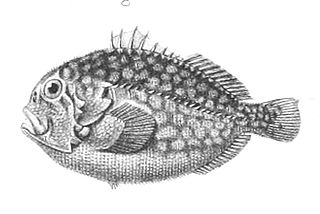
Caracanthus, the coral crouchers, or orbicular velvetfishes, are a genus of ray-finned fishes. They live in coral reefs of the tropical Indo-Pacific. This genus is the only member of the monotypic subfamily Caracanthinae, part of the family Scorpaenidae.

Pomacentrus moluccensis, the lemon damselfish, is a species of bony fish in the family Pomacentridae, from the Western Pacific Ocean. It occasionally makes its way into the aquarium trade. It grows to a size of 9 cm (4 in) in length.
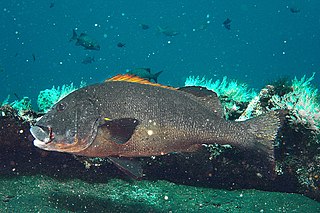
Plectorhinchus albovittatus, the two-striped sweetlips or giant sweetlips, is a species of marine ray-finned fish, a sweetlips belonging to the subfamily Plectorhinchinae, part of the grunt family Haemulidae. It is native to the Indian Ocean and the western Pacific Ocean.

The gold-band fusilier also known as the yellow-band fusilier or black-tipped fusilier, is a species of marine ray-finned fish, a fusilier belonging to the family Caesionidae. It is widespread around reefs in the Indo-West Pacific region.

The humpback red snapper, the paddletail, paddletail snapper or hunchback snapper, is a species of marine ray-finned fish, a snapper belonging to the family Lutjanidae. It has a wide Indo-West Pacific distribution. It is a commercially important species, as well as being sought after as a game fish. It is also a popular species for display in public aquaria. It has been reported to cause ciguatera poisoning.

The redmouth grouper, also known as the red-flushed rock cod is a species of ray-finned fish, a grouper from the subfamily Epinephelinae which is part of the family Serranidae, which also includes the anthias and sea basses. It has a wide distribution in the Indian and Pacific Oceans. It is considered a game fish.
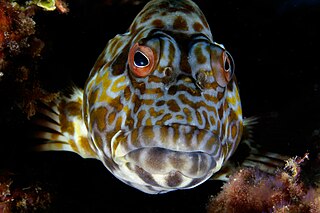
Cirrhitus is a genus of marine ray-finned fish, hawkfishes from the family Cirrhitidae. The species in this genus are found on tropical reefs worldwide.

Caesio caerulaurea, the blue and gold fusilier, blue fusilier, gold-band fusilier or scissor-tailed fusilier, is a species of marine fish in the family Caesionidae. It is widespread throughout the tropical waters of the Indo-Pacific area, including the Red Sea.

Pempheris is a genus of sweepers native to the Atlantic, Indian and Pacific Ocean.
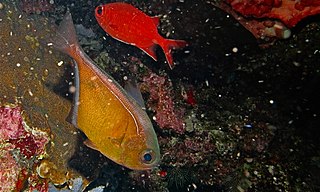
Pempheris vanicolensis, the Vanikoro sweeper or greenback bullseye is a species of Indo-Pacific fish from the family Pempheridae, the sweepers.
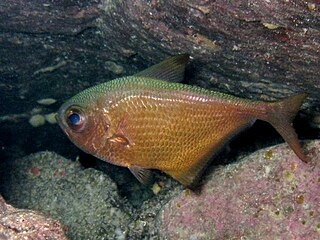
Pempheris mangula, the black-edged sweeper, Moluccan sweeper or black-margin bullseye is a species of Indo-Pacific sweeper from the family Pempheridae. The history of the identification of the Indo-Pacific sweepers is complex and this species has been identified as the "Pempheris vanicolensis" which has colonised the Mediterranean Sea from the Red Sea via the Suez Canal by Lessepsian migration but this identification is not universally accepted.
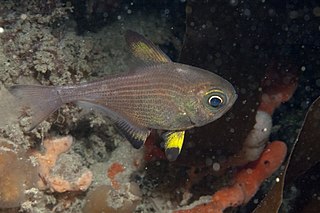
Pempheris multiradiata, the bigscale bullseye, large-scaled bullseye or common bullseye, is a species of marine ray-finned fish, a sweeper from the family Pempheridae which is found in the coastal waters of southern Australia.
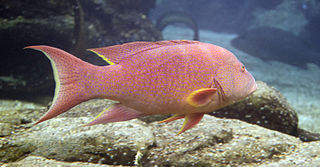
The white-edged lyretail, also known as the white-edge coronation trout, lyretail grouper, lyretail trout, white-edged lyretail-cod or white-fringed moontail-bass, is a species of marine ray-finned fish, a grouper from the subfamily Epinephelinae which is part of the family Serranidae, which also includes the anthias and sea basses. It is found in the Indo-Pacific region but it is an uncommon species.
Pempheris poeyi, the curved sweeper and shortfin sweeper, is a species of marine ray-finned fish, a sweeper in the family Pempheridae from the western Atlantic Ocean.

Pempheris affinis, the black-tipped bullseye, is a species of marine ray-finned fish in the family Pempheridae, the sweepers. It is from the southwestern Pacific Ocean.

Dermatolepis dermatolepis, the leather bass is a species of marine ray-finned fish, a grouper from the subfamily Epinephelinae which is part of the family Serranidae, which also includes the anthias and sea basses. It is a predatory reef fish which is found in the eastern Pacific Ocean.




















